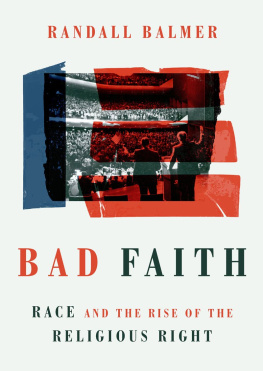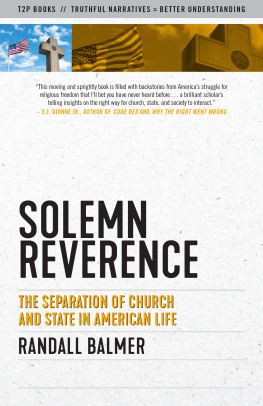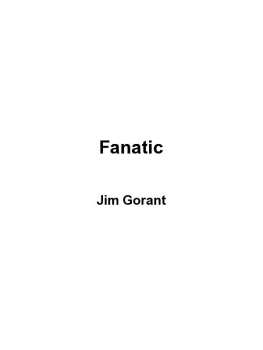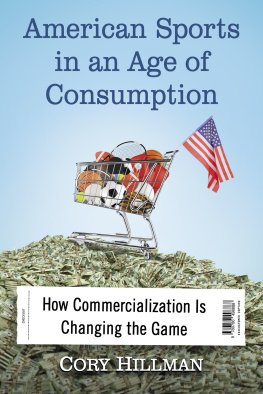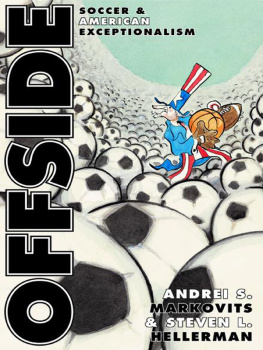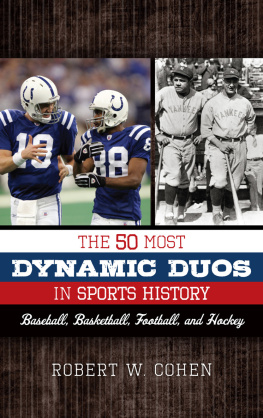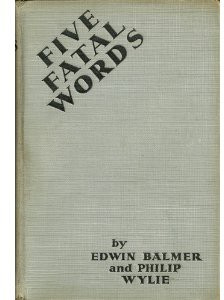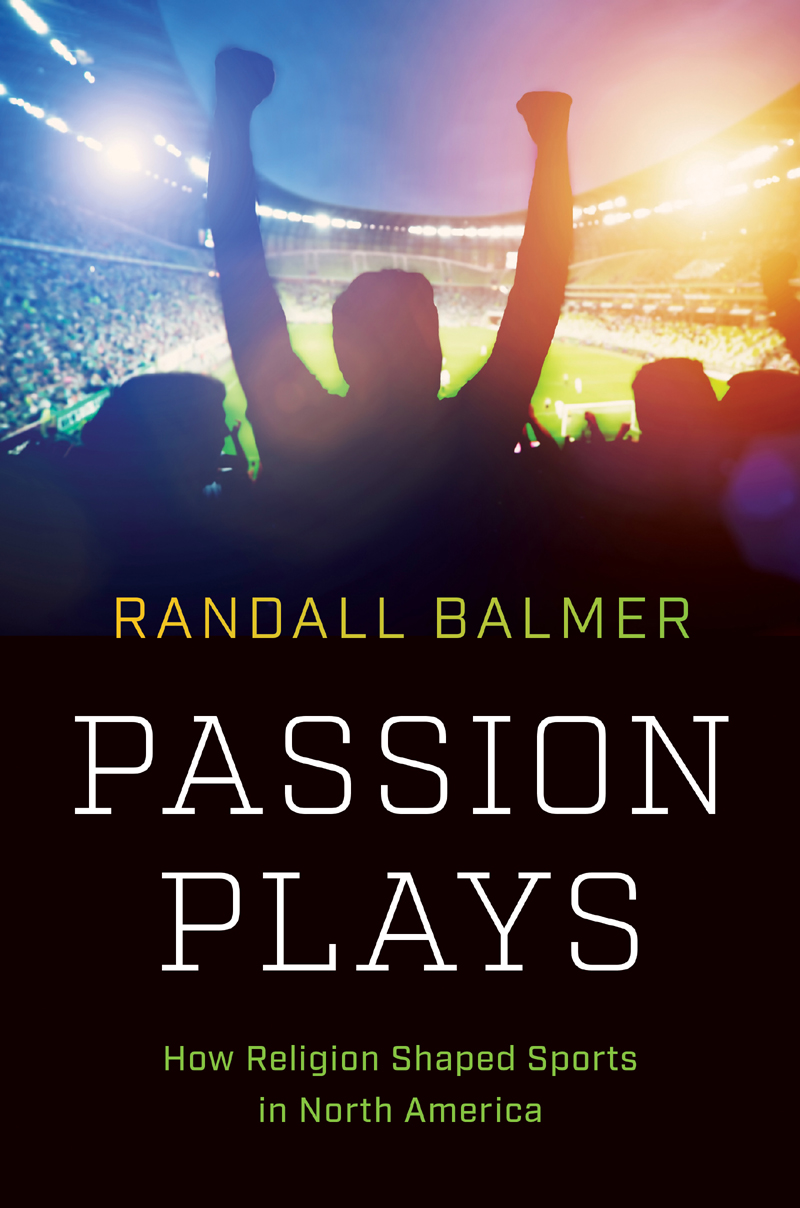
Passion Plays
Also by Randall Balmer
Bad Faith: Race and the Rise of the Religious Right
Solemn Reverence: The Separation of Church and State in American Life
Evangelicalism in America
Redeemer: The Life of Jimmy Carter
First Freedom: The Fight for Religious Liberty
The Making of Evangelicalism: From Revivalism to Politics and Beyond
God in the White House: How Faith Shaped the Presidency from John F. Kennedy to George W. Bush
Thy Kingdom Come: How the Religious Right Distorts the Faith and Threatens America
Religion in American Life: A Short History [with Jon Butler and Grant Wacker]
Protestantism in America [with Lauren F. Winner]
Encyclopedia of Evangelicalism
Growing Pains: Learning to Love My Fathers Faith
Religion in Twentieth Century America
Blessed Assurance: A History of Evangelicalism in America
Grant Us Courage: Travels Along the Mainline of American Protestantism
The Presbyterians [with John R. Fitzmier]
Mine Eyes Have Seen the Glory: A Journey into the Evangelical Subculture in America
A Perfect Babel of Confusion: Dutch Religion and English Culture in the Middle Colonies
This book was published under the Marcie Cohen Ferris and William R. Ferris Imprint of the University of North Carolina Press.
2022 Randall Balmer
All rights reserved
Set in Scala Pro, Avenir LT Std & Museo Slab
by codeMantra
Manufactured in the United States of America
The University of North Carolina Press has been a member of the Green Press Initiative since 2003.
Cover photo iStockphoto/NiseriN.
Complete Library of Congress Cataloging-in-Publication Data is available at https://lccn.loc.gov/2022015059.
ISBN 978-1-4696-7006-5 (cloth: alk. paper)
ISBN 978-1-4696-7007-2 (ebook)
For Mary and John Murrin
To every thing there is a season, and a time to every purpose under the heaven.
Ecclesiastes 3:1
A ballpark at night is more like a church than a church.
W. P. Kinsella
Any object, intensely regarded, may be a gate of access to the incorruptible eon of the gods.
James Joyce
Contents
Illustrations
Maps
Figures
Passion Plays
Introduction
To Everything a Season
The Peculiar Passion Surrounding Team Sports
Similarly, if anyone competes as an athlete, he does not receive the victors crown unless he competes according to the rules.
2 TIMOTHY 2:5
Play is the forerunner of religion, so religion should be the friend of play.
HORACE BUSHNELL
The immediate catalyst for this book was my discovery of sports radio sometime in the early 1990s. Initially, it left me speechless. I was utterly dumbfounded that radio hosts could sustain a conversation and a debate for hours and hours about whether or not Joe TorreI was working in New York City at the timeshould have pulled the starting pitcher with two outs in the bottom of the sixth, or whether the Jets should have punted on fourth-and-one at the forty-three-yard line. What entranced me was the passion that both hosts and callers brought to the subject. Vinny from Queens worried about the back end of the Yankees starting rotation, Doris from Rego Park regularly fretted over the Mets bullpen, and Jerome from Manhattan worked himself into a lather over the composition of the Yankees roster, becoming so apoplectic in the course of his calls that his physician finally ordered him to stop calling. The rhetoric grew so fevered you might think the topic was nuclear disarmament or the collapse of democratic institutions, not whether the Twins should have used Joe Mauer as a pinch-hitter in the top of the eighth inning.
To take another example, in early 2015 the world of sportsand much of the nationwas abuzz about allegations that the New England Patriots had tampered with the footballs used in their playoff victory over the Indianapolis Colts. For me, the more interesting question is why we care so much about matters such as these. In a world wracked by war and disease and terrorism and political upheaval, why was so much ink spilled over whether or not a couple of pounds of air pressure mysteriously went missing from a dozen or so footballs? Why do we care so much about whether Tom Brady was slinging underinflated footballs into the night sky? Its only a game, right?
Ive enjoyed sports all my life, both as participant and spectator, and I have my team allegiances, but I would never describe myself as a hard-core or, to employ the vernacular of sports radio, die-hard or big-time fan. But the longer I listenedand I confess that I became addictedthe more I wanted to figure out why sports invokes such peculiar passion. That is the burden of this book, and in a very real sense it represents an attempt to understand myself.
Passion Plays examines how the history of religion across North America connects in fascinating ways to the emergence of modern team sportsand this chronicle in turn illustrates why sports inspires such passionate intensity. Passion Plays argues that sports has evolved into a phenomenon that generates at least as much passion as traditional religion. Drawing on indices of popularity and devotion, I will suggest that, especially among the demographic of white males, the devotion to sports has eclipsed allegiance to traditional expressions of religion. To be clear, I am not arguing that sports is a religion in any conventional sense of the word, even though there are family resemblances between the two. Team sports may provide a sense of community, perhaps, or take on some of the trappings of religionprocessions, sacred space, pilgrimagebut sports does not forgive sins or grant salvation. The world of sports provides many narratives of redemption, both individual and collectivea woeful teams ascent from worst to first, Kurt Warners rise from supermarket stock boy to Super Bowlwinning quarterback and the Hall of Fame, David Ayress summons from the Zamboni to serve as emergency goalie and notch a win for the Carolina Hurricanes, Sean Kazmars promotion to the major leagues at the age of thirty-four. But such stories, inspiring as they are, dont carry the cosmic weight of a Lakota sun dance or the burning of Zozobra in New Mexico, Hindu purification rituals, or the drama of redemption described in the New Testament. Sports can teach us about the physics of speed or the economics of the salary cap or the vagaries of the infield fly rule, but it provides precious little help deciphering the mysteries of the universe. Nevertheless, as even a cursory glance at the stands will attest, there are undeniable parallels between (sports) fans and (religious) fanatics, and it is at least arguable that the real locus of popular devotion in North America has shifted from the sanctuary to the stadium.
Not all sports fans, it must be acknowledged, gravitated to the stadium directly from church. Many were long accustomed to finding more meaning, depth, profundity, ultimacy, community, and even salvation on any given Saturday at the ballpark than at last Sundays mass. For them, sports has always been at least as important as religion, perhaps more so.
Competitive team sports developed in North America at a time of rapid social, economic, political, demographicand religiouschange. From the emergence of baseball in the 1840s to the invention of basketball in 1891, North America was in transition. The Industrial Revolution created vast disparities of wealth, but it also altered patterns of subsistence and male sociability; men began working outside of the farms and socialized with fellow workers. Americans gravitated toward the cities, where they encountered immigrants from Ireland, Germany, Italy, Scandinavia, and other places. Railroad lines knitted the continent together in something resembling a tapestry, making frontiers accessible. Canadians were forging their national identity at the same time the United States played out its moral crisis on the battlefields of Bull Run, Gettysburg, Antietam, and Chickamauga, exacting a fearsome toll of casualties, roughly 2 percent of the nations population.
Next page

